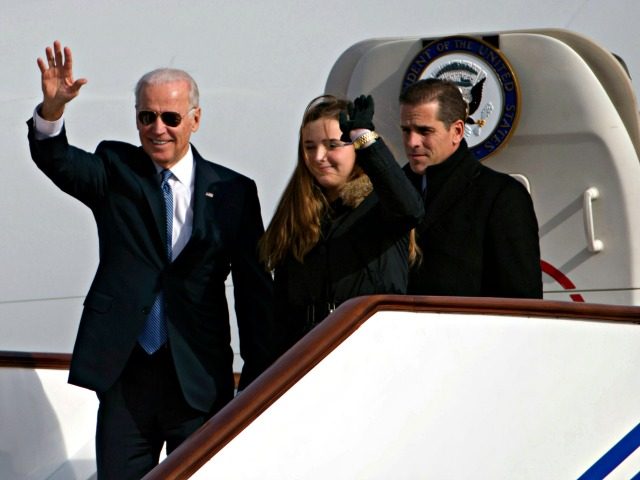Bohai Harvest RST (BHR), a private equity firm bankrolled by the Chinese government that is tied to Hunter Biden, invested in a company that has been blacklisted by the U.S. government.
Fox News reported on Wednesday that BHR owns a stake in Megvii Technology, a Chinese technology company that designs image recognition and deep-learning software. Megvii, whose technology is in line with China’s efforts to use facial recognition systems to boost its civilian surveillance capacities, is also partially backed by the Chinese tech giant Alibaba.
The company, which plans to launch its initial public offering sometime later this year, was blacklisted by the Trump administration earlier this week on the grounds that its technology had been used by the Chinese government to repress the Muslim minorities in the country’s Xinjiang Uighur region. The Commerce Department said that Megvii is one of 28 Chinese companies that will be banned from doing business in the U.S. because of such conduct.
The Trump administration said in denouncing the decision:
Specifically, these entities have been implicated in human rights violations and abuses in the implementation of China’s campaign of repression, mass arbitrary detention, and high-technology surveillance against Uighurs, Kazakhs, and other members of Muslim minority groups in [Xinjiang].
The news came shortly after BHR disclosed it was weighing if and how it should explain its working relationship with Hunter Biden amid public scrutiny over his business dealings with the government of China. The controversy first started when President Donald Trump called on the Chinese government to investigate the company’s ties to the Biden family.
As Peter Schweizer, senior contributor at Breitbart News, revealed in his bestselling book — Secret Empires: How the American Political Class Hides Corruption and Enriches Family and Friends — Hunter Biden inked the multibillion dollar deal that created BHR with a subsidiary of the state-owned Bank of China in 2013.
The timing of the lucrative deal has been brought into question, as it came only 12 days after Hunter visited China with his father aboard Air Force Two. Officially, the then-vice president was visiting the country amid escalating tensions over islands in the South China Sea and decided to bring his granddaughter and son along. In a March 2018 interview with Breitbart News Tonight, however, Schweizer detailed the political machinations that preceded Hunter Biden’s $1.5 billion venture with China:
In December of 2013, Vice President Joe Biden flies to Asia for a trip, and the centerpiece for that trip is a visit to Beijing, China. To put this into context, in 2013, the Chinese have just exerted air rights over the South Pacific, the South China Sea. They basically have said, ‘If you want to fly in this area, you have to get Chinese approval. We are claiming sovereignty over this territory.’ Highly controversial in Japan, in the Philippines, and in other countries. Joe Biden is supposed to be going there to confront the Chinese. Well, he gets widely criticized on that trip for going soft on China. For basically not challenging them, and Japan and other countries are quite upset about this.
Since its creation, BHR has invested heavily in energy and defense projects across the globe. As of June, Hunter Biden was still involved with BHR, sitting on its board of directors and owning a minority stake of the fund estimated to be worth more than $430,000.
Apart from the shadowy timing of BHR’s inception, the company and Hunter Biden have also caught the eye of investigators in Congress for the purchase of a U.S. company with insight into military technology.
In 2015, BHR and the Aviation Industry Corporation of China (AVIC) — an aerospace and defense conglomerate owned and operated by the Chinese government — made a $600 million bid to purchase Henniges, a Michigan-based automotive company. The sale required approval from the Obama-Biden administration’s Committee on Foreign Investment in the United States (CFIUS), as AVIC was a subsidiary of the Chinese government and Henniges produced “dual-use” anti-vibration technology with U.S. “military applications.” CFIUS, which is made up of representatives from 16 different federal bodies including the Departments of State, Treasury, and Defense, is required to review any transaction with national security implications.
When the AVIC and BHR’s bid was first announced, alarm bells went off in certain sectors of the defense industry. In particular, many noted that AVIC was “reportedly involved in stealing sensitive data regarding the Joint Strike Fighter program,” which it later “reportedly incorporated … into China’s J-20 and J‑31 aircraft.”
Despite the national security concerns, CFIUS approved the deal with AVIC, purchasing 51 percent of the company while BHR took ownership of the other 49 percent. Upon purchase, an industry newsletter stated the deal was the “biggest Chinese investment into US automotive manufacturing assets to date.”
Although the deal was approved by the Obama administration, it has not escaped congressional scrutiny. In August, Senate Finance Committee Chairman Chuck Grassley (R-IA) launched a probe into whether or not the CFIUS decision was influenced by either Joe Biden or former Secretary of State John Kerry, whose stepson was also involved in the venture.
“The direct involvement of Mr. Hunter Biden and Mr. Heinz in the acquisition of Henniges by the Chinese government creates a potential conflict of interest,” Grassley noted when launching the probe.
In the wake of such scrutiny, the former vice president has refused to answer questions regarding his son’s business dealings, choosing rather to accuse Trump of abusing his power.
“One thing about this president is absolutely clear, and I don’t think anyone can contradict this, he has seen no limits to his power regardless of what the Constitution says,” Biden said on Wednesday when calling for the president’s impeachment.

COMMENTS
Please let us know if you're having issues with commenting.